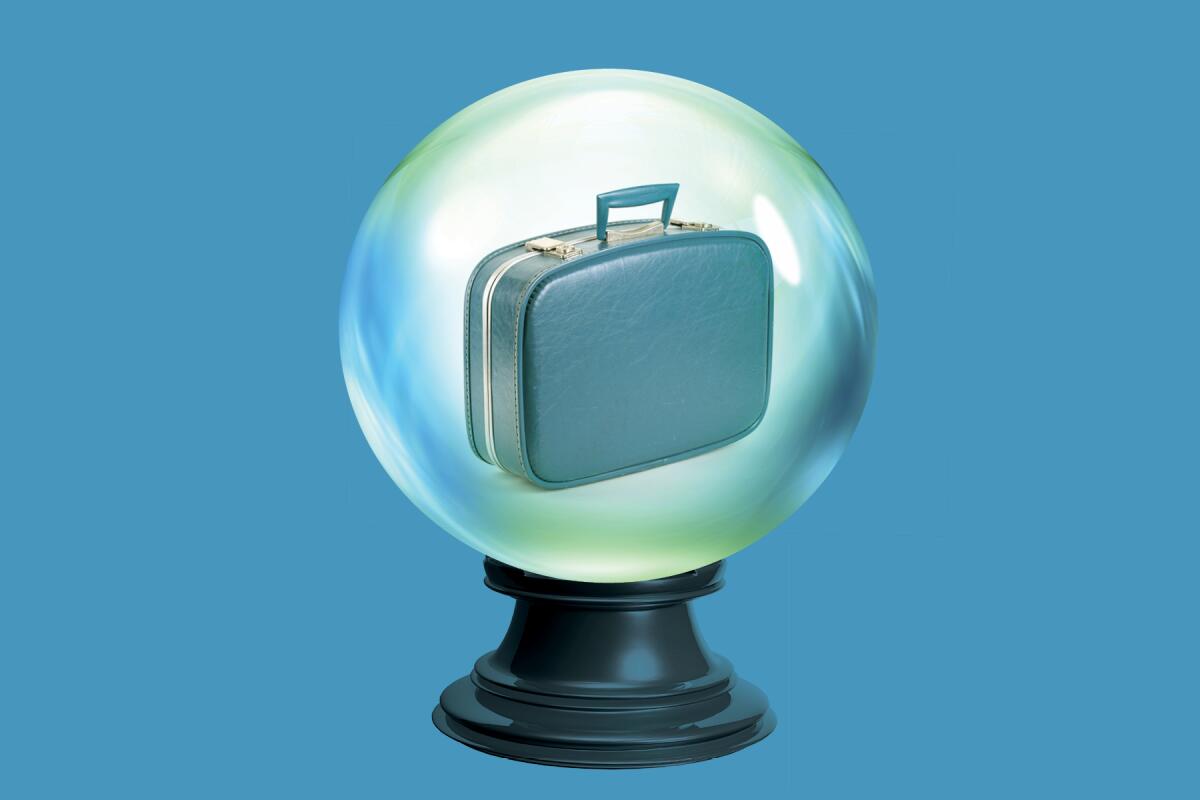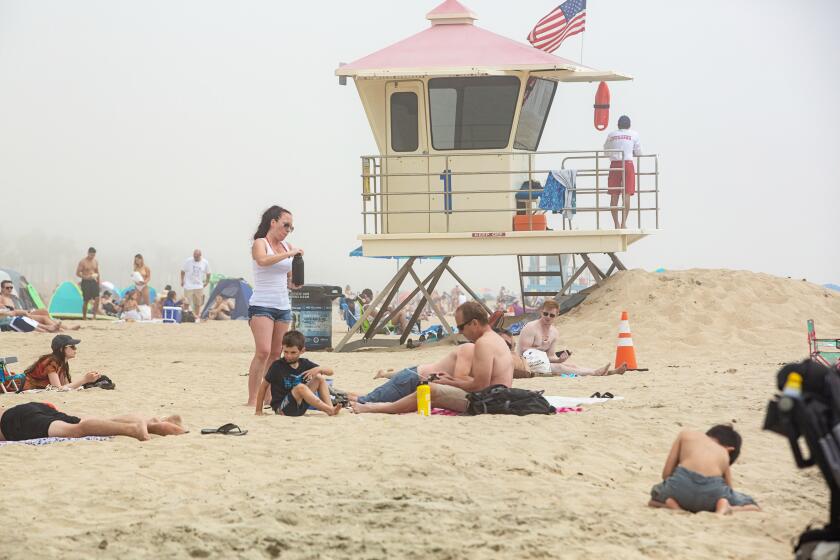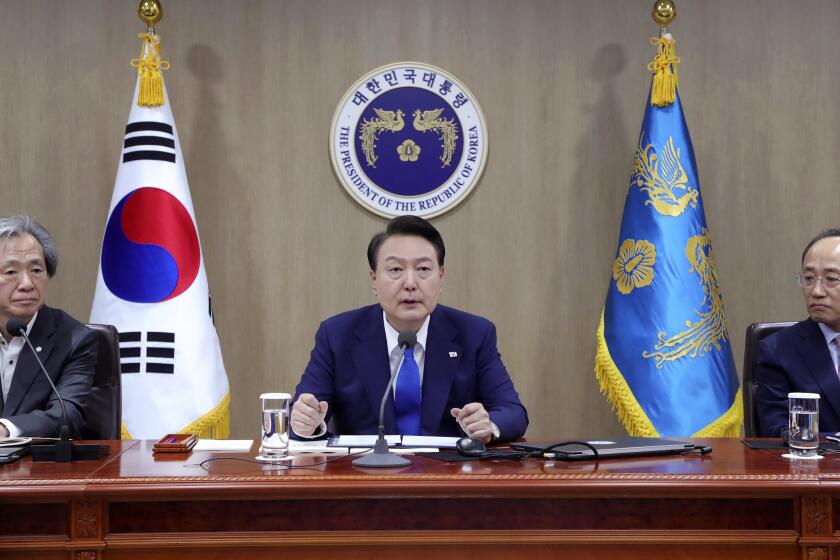After coronavirus: Your next hotel stay may look like this

On your first post-pandemic hotel stay, whenever that happens, management will be glad to see you. But don’t expect to see the front-desk clerk‘s smile.
Or offer you a cookie. Or invite you to a wine-and-cheese happy hour. You might not even get a room key. And you might be glad about it all.
The coronavirus has turned hotel conventional wisdom on its head. After years of emphasizing the importance of face time and people skills among their “front-of-house” staffers, hotels will be obliged to outfit them with masks (no smiles visible) and turn a spotlight on their housekeeping teams. Many other hotel traditions are threatened as well.
“The buffet could potentially go away for good,” said Tamara Mims, president of Four Sisters Inns in Monterey.
On the other hand, “any customer at any price point is accustomed to some kind of buffet,” said Phil Cordell, Hilton’s global head of new brand development. “I think it’s not dead. I think how it’s presented and prepared will likely change in a very long-term way.”
Here’s a quick look at other changes travelers may encounter. If you’d forgotten that the word “hospitality” has a hospital in it, this might remedy that.
Lysol takes center stage
How eager are hotels to be seen as clean and safe? Hilton’s newest business partners are the Mayo Clinic and the makers of Lysol.
On Monday the global hotel company unveiled the new alliance (Hilton Cleanstay with Lysol Protection), saying it would welcome the cleaning-product expertise of RB (which owns Lysol and Dettol products) and the advice of the Mayo Clinic’s Infection Prevention and Control team.
As the pandemic fight evolves, some public lands are easing restrictions
“Before, cleanliness happened behind the scenes,” said Cordell. Now “visibility is going to be very much an expectation.”
Many new hotel habits will depend on local and state laws. But for the foreseeable future, guests will see more hand sanitizers, more signs about social distancing, less furniture (to make room) and all staffers in face coverings — but not necessarily bland ones.
Hilton will be looking at customs designs to convey welcome in the absence of a visible smile, Cordell said. There’s also talk of adopting a new gesture, perhaps a hand over the heart.
Then, every hour or two during peak check-in and check-out periods, Cordell said, “we are going to have a team member in the lobby who is visibly cleaning those most-touched surfaces.”
At Hilton’s fancier brands, guests may see white-glove service, denoting luxury and cleanliness.
At the budget end of the price spectrum, if you’re a regular guest at Hilton’s Hampton Inns, Cordell said, “you’re used to making your waffle” in the hotel’s grab-and-go breakfast area. Going forward, the hotel will instead “curate” the six to eight most popular items and put them in sealed bags.
Guests can eat in the breakfast room, take the food back to their rooms or take it out of the building. But no more making your own waffles.
For a closer look at how these things might work in Las Vegas, look to Wynn Resorts, where Chief Executive Matt Maddox on April 19 released a detailed report outlining why and how he thinks he should open his properties, perhaps as early as mid-May.
The islands will keep stay-at-home rules in place to stop the spread of the coronavirus.
Maddox suggested thermal cameras at all entrances to “allow our security team to conduct noninvasive temperature checks.” (Nobody with a temperature higher than 100 degrees would be allowed in.) All employees would be required to wash hands at least hourly, and arriving guests would be “asked to use hand sanitizer and to wear a mask (which will be provided by the resort).”
Once inside, Wynn guests would ride no more than four to an elevator, and employees would sanitize the buttons at least hourly. If you should run afoul of the security staff, handcuffs and holding rooms would be sanitized after each use.
Maryland-based Marriott, which includes 7,300 hotels worldwide, is planning an array of post-coronavirus measures, including “electrostatic sprayers with hospital-grade disinfectant” to sanitize surfaces in guest rooms and public areas, and to do so more frequently.
The company also said it is testing “ultraviolet light technology” for cleaning and may add partitions at front desks. And then there’s the buffet.
Most likely, said Marriott spokeswoman Connie Kim, “we will be serving individual grab-and-go for some time.” When hotels are full again and buffets make more economic sense, “we will likely be exploring partitions, making sure social distancing is practiced in lines and likely using individual servers” rather than having guests serve themselves.
At smaller hotels, such as the 16 California boutique properties run by the Four Sisters Inns, the changes will be just as notable, Mims said. She foresees more texting and emailing with guests, before and during their stays, to meet their needs without compromising social distancing.
Instead of the front-desk cookie, Mims said, her staffers will add packaged cookies to guest rooms. Instead of a breakfast buffet, staff will take orders and deliver meals to guests’ tables or their rooms.
If anybody on staff sees a chance to clean up — “housekeeping, at this point, becomes everyone’s job,” Mims said. “That’s the mindset we need.”
In your room
Housekeepers will give guest rooms a more thorough cleaning, those interviewed for this story said. And those rooms may house fewer people.
Part of this is the reeling economy. A recent report by the American Hotel & Lodging Assn. found that 4 of 5 U.S. hotel rooms are empty now, and that 7 of every 10 U.S. hotel workers have been laid off or furloughed.
Vacancies give germs more time to die. With that in mind, Airbnb announced April 27 that it would start requiring its hosts to leave rooms empty for at least 24 hours between guests.
At Four Sisters, Mims said she and her team have been thinking about doing the same thing. They have also considered having housekeepers clean rooms only after guests check out, not during multiple-night stays. And Mims may add software that lets your cellphone serve as your room key.
That’s also possible with the Marriott Bonvoy app, launched well before the coronavirus emerged. It allows arriving guests to receive a notice when their room are ready, to check in with their mobile phones and then use their phones to access their rooms, thereby avoiding key cards. Those guests can use their mobile phones to order room service, which can be packaged and delivered to guest rooms without contact.
Digital Key, available through the Hilton Honors app, is a similar program; it allows travelers to choose a room, check in, then open the room with their cellphone. The program was developed as a time-saver; before the pandemic, about 30% of eligible guests chose to use it, Hilton said. But Cordell expects that percentage to jump much higher.
Will there be more changes? Almost certainly.
At Marriott, a Global Cleanliness Council of executives is working to decide which changes to try at which of the company’s 32 brands, which include Ritz-Carlton (at the high end) and Fairfield Inn (at the other end).
At Hilton, Cordell said, every guest-room object is getting new scrutiny, especially printed matter such as promotional literature and tourist magazines.
“We’re just going to have to go chapter by chapter and write this playbook as we see how people react,” Cordell said.
More to Read
Sign up for The Wild
We’ll help you find the best places to hike, bike and run, as well as the perfect silent spots for meditation and yoga.
You may occasionally receive promotional content from the Los Angeles Times.









